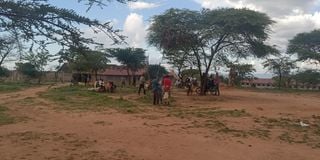15-year-old peace deal threatened as cattle raids resurface at Kenya/Uganda border

Residents of Kanyerus area along the Kenya-Uganda border on April, 20, 2023. Local leaders are concerned over fresh cattle raids along the border, which are threatening a 15-year old peace deal among communities from the two countries.
What you need to know:
- The raids had been tamed by a disarmament programme between 2001 and 2010
- The region enjoyed almost 20 years of relative peace as a result
- Pokot leaders are concerned over the recent spate of insecurity and called on the two governments to intervene quickly
A 15-year-old peace agreement between communities in Kenya and Uganda is under threat after cattle raiding resumed along the border between the two East African countries.
Cattle raiding has resumed along the Kenya-Uganda border, threatening to unravel a peace agreement between the Sebei, Karamojong and Pokots.
The raids had been tamed by a disarmament programme between 2001 and 2010 in which the Ugandan government collected more than 40,000 weapons. As a result, the region enjoyed almost 20 years of relative peace.
Recently, however, the region has suffered a series of cattle raids, which local leaders and security officials say have 'intensified this year'.
Just recently, hundreds of cattle were driven off in the Kanyerus area of West Pokot County by suspected bandits from Uganda.
In Kacheliba on Sunday, Pokot leaders expressed concern over the recent spate of insecurity and called on the two governments to intervene quickly.
Underlying issues
Kacheliba MP Titus Lotee argued that despite the existing peace agreement, the governments of Uganda and Kenya were not doing enough to address the poverty and other development needs of the communities that trigger cattle rustling.
"Disarmament alone is not enough. Governments need to refocus communities on development and address the root causes of these attacks. Young people need jobs and other locals need services. Without these, they will revert to cattle raiding," he said.
West Pokot Senator Julius Murgor said herders pursuing their stolen cattle were being harassed by administrators and security officers.
"We want the administrators to cooperate and return the stolen animals by not harassing the herders," he said.
Mr Murgor is concerned that a new wave of insecurity along the border between the two countries could affect development and stability in the region.
The senator called on people living along the border to embrace peace and education and to send their children to school.
"Uneducated people perpetuate banditry and cattle rustling. Residents should also embrace peace. The few schools in the area have few children," he said.
Peaceful co-existence
Bishop Henry Juma Odunya of Kitale Catholic Diocese called for peaceful co-existence.
"We are working with all stakeholders to promote peace in the region," he said, stressing the importance of residents embracing education as a universal human right.
Renewed cross-border cattle rustling is a setback to recent efforts by both countries and non-governmental organisations to develop the pastoralist communities of the Karamojong and Sebei in Uganda, and the Turkana and Pokot in Kenya.





